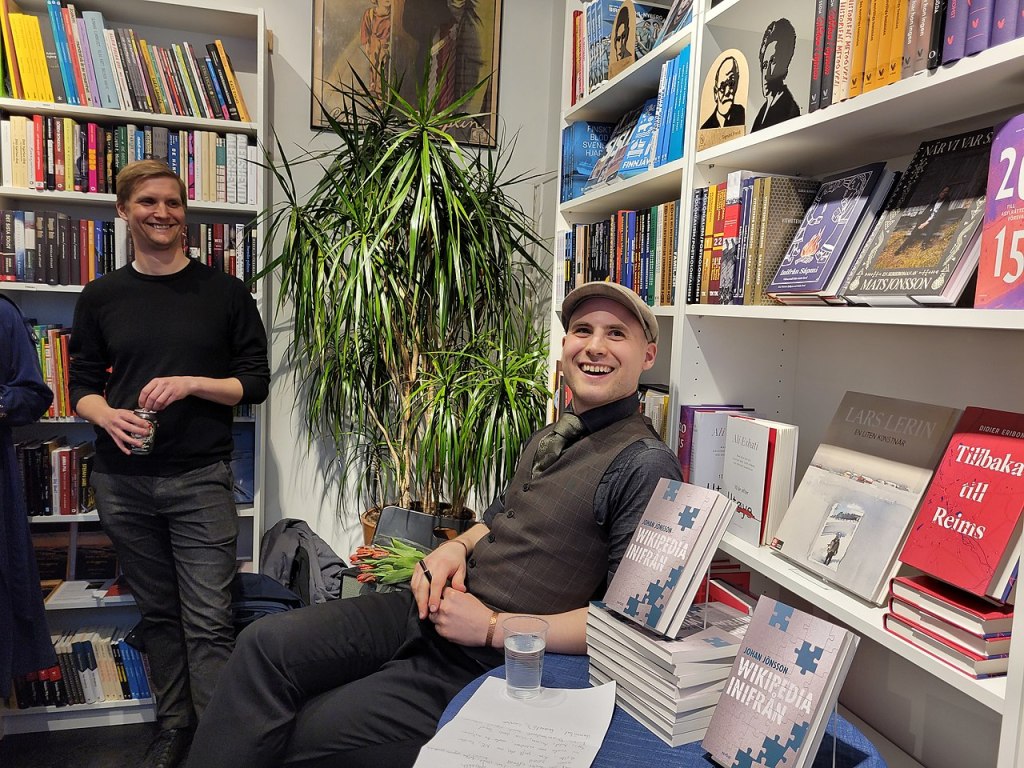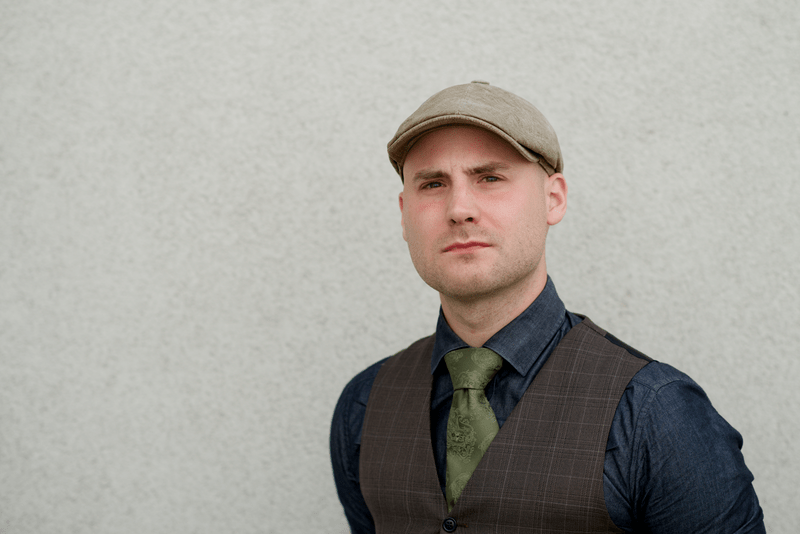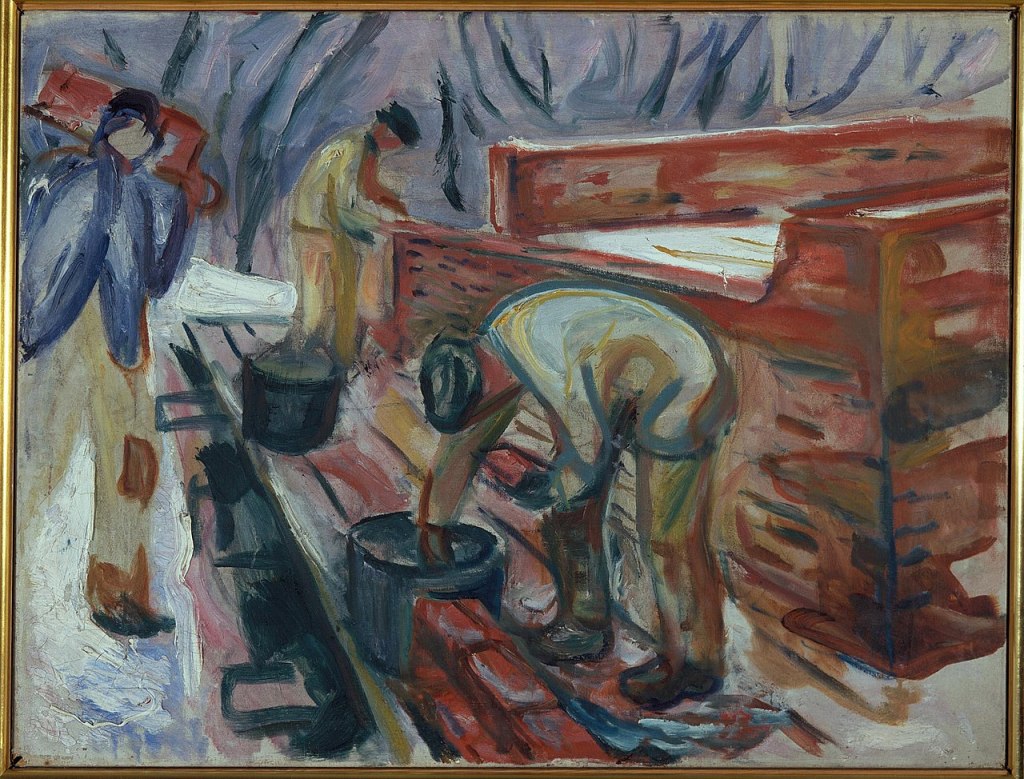Slowly falling into the trap
In 2011, I was working for Wikimedia Sweden for a few months, contracting for a project which honestly didn’t really lead anywhere but taught us some lessons about having staff – the chapter had never hired anyone before. I had been editing since 2004 but never spent a lot of time engaging with anyone outside of the wiki. Part of my responsibilities was to handle media, and so I did a few interviews, co-wrote a press release and slowly got stuck in yet another niche of Wikimedian work we have to cover: explaining what we do to the public.
I wasn’t the only one: the Swedish chapter was already doing work around this and then-active Wikipedian Lennart Guldbrandsson had taken upon himself to educate the Swedish public on how Wikipedia functioned, but we didn’t have an abundance of voices talking to the outside world. I hesitatingly wrote my first article about Wikipedia aimed at an outside audience, a comment on how Swedish Wikipedia covered China for a small Swedish magazine called Kinarapport (“China Report”), covering issues like lack of coverage, neutrality, editing conflicts, differences between treatment in the different Wikipedias, and how Swedish Wikipedia too often ends up using English names for Chinese places and organisations. I had been writing on literature for various magazines since my teens, but had to apply my tools to new content.
Between 2012 and 2014 I served as the press officer of Swedish Wikipedia, a position we had instituted in 2006 to handle inquiries from the media. I took calls, met journalists, wrote press releases and got a few really odd phone calls, as one might expect when one’s personal phone number is the only available Swedish number on one of the biggest websites in the world. This put most of my focus towards helping others with their texts rather than writing my own, but kept me engaged in how the surrounding world tried to make sense of us. In 2014, I had started toying with the idea of writing a book about Wikipedia. I had run a couple of Wikipedia blogs with limited reach, but little for a wider audience. Lennart had written a guide to how the encyclopedia worked, but I wanted something different – more theoretical but also of broader appeal, the kind of book which would make it easier for readers to understand how the information which helped form their understanding of the world came to be, but wouldn’t necessarily help them find the edit button.
Then, in the first half of 2015, as I was still mulling the idea, I started working for the Wikimedia Foundation, which rather complicated the situation. It wasn’t that they didn’t know what they were getting: I assume my experience explaining Wikipedia was part of why I got the job, and I mentioned my plans when I was interviewed, but still: How do you write about something which will inevitably touch upon your employer, with any shred of credibility?
I shelved my plans for a few years, uncertain about how to proceed, but in 2020 I found myself with ample time on my hands and a strategy I finally found myself comfortable with: I’d discard any hint of impartiality. In tone and content, I’d tell a personal story not only about Wikipedia but also about being Wikipedian. I’d add attempts at humour and sarcasm, anecdotes about editing and going to Wikimania, chapters explaining how the encyclopedia worked and between them shorter interludes trying to give a feeling for how it is to be part of the movement. It felt rather uncomfortable to put so much of my personal experience into a book about such a significant collective effort but it was the only way I could find around the shackles of my formal responsibilities. Having found a publisher, the book was finally published in 2022, having lived in my head for almost eight years. Freed of no, I should write a book instead every time I thought about something I should write for the general public it was suddenly far easier to find the time to write other things too: on the project to clean up after bot-created articles on Swedish Wikipedia for a major newspaper, on why archival content can be difficult to use as a source for an academic journal, on how one can spend countless hours to be able to add two sentences to a biography about a forgotten painter for a political magazine where the culture editor happens to be a Wikipedian, and other topics.

But there are complications.
On different roles
I am, at the very least, two different persons in the Wikimedia sphere. I am my normal editor me, the Wikipedian and Commons photographer, occasional author of encyclopedic entries, proofreader, source hunter, casual patroller, perhaps mainly a Swedish Wikipedia admin and checkuser. And I’m the Wikimedia Foundation staffer: part of the product development process, builder of processes to involve the communities, manager and sporadic budget fiddler.
I work hard to keep these roles apart in all situations. The Foundation doesn’t meddle with the content. My duties as a Wikimedian in my spare time are useful in that they inform my professional me, but it would be perilous to assume they would give me insight into what the communities need, instead of helping me understand how to ask and interpret the responses. As I try to explain the wikis to the outside world this becomes even more important: I do not speak for the Foundation: emphasised not only because it’s true but also out of professional necessity.
This is difficult not only because most readers don’t really care much about the difference between the professionalised foundation and the encyclopedic hobbyists, but also because the two roles can’t be hermetically sealed off from each other. At the end of the day these two personas live in the same person. And as I write, I need to be transparent about my connections and positions: not only that I’m a Swedish Wikipedian but professionally connected, too. So I work here but that’s not terribly relevant in comparison to my other conflicts of interest is almost impossible to convey in a reasonable manner in a few seconds.
And so I end up seeking a third identity: the partial observer, who is by definition favourably disposed towards the encyclopedia but attempts to be uncompromising about talking about our weaknesses and limitations as well as our strengths. By definition, this analysis is formed by opinions. I talk about how I think our use of images doesn’t live up to the neutral point of view, how difficult it is to write balanced biographies when people add recent controversies in alluring detail, how the higher demands on sources over time has made us less welcoming, as helping a newcomer get their entry good enough becomes so much more time-consuming than it used to be. This isn’t necessarily representative of what the movement thinks, but I can only write as myself: it would be far worse to pretend to speak for anyone but myself, at least since I stepped down as the spokesperson of Swedish Wikipedia in 2014. And yet both the readers and the editors who accept my texts need to understand how biased I am.
I can never dislodge myself completely from my other roles, never shake off all my chains. One limitation: to avoid confusion, I steer clear of anything related to my employment. I don’t pretend to be able to comment on work I do as an outsider. Another one: I’m unwilling to give away too much about how to evade our systems to catch and revert hoaxes and vandalism. I want our readers to better understand us, including our flaws and deficiencies, because I think it will help them better engage with Wikipedia. I don’t want to actively hurt us. A third complication: it would be terribly impolite to surprise my Foundation co-workers, and so I keep my colleagues working with external communications informed of how my Wikimedia editor me does his own educational outreach.
And one is never truly representing only oneself: With few others Wikimedians being visible in the public sphere in Sweden, the more one writes, or turns up for a television or newspaper interview, the more one becomes a public face of the wiki – which is an uncomfortable role as it tends to assign far more importance to the person being seen than is merited. It’s important to explain how Wikipedia works – but it’s more important to actually write the encyclopedia, illustrate it, keep it free from spam and vandalism and all the other tasks which go into making it work.
On audiences and languages
Most of my time is spent trying to explain Wikipedia and the Wikimedia world to the outside world: explaining Wikipedia to Wikimedians is typically not quite as useful.
So I write in Swedish. There’re already so many books and texts in English: Andrew Lih, Joseph Reagle, Nathaniel Tkacz, Dariusz Jemielniak, Heather Ford, Emiel Rijshouwer – so many have already written on the topic. There’s very little in Swedish and specifically on Swedish Wikipedia. At the end of the day, like many other people, I care more about my native language. And not least, I’ll never truly be as comfortable writing in English as in Swedish. It remains gravel in my mouth as I speak, mittens on my hands as I write, cotton around my thoughts, the death of eloquence and precision. Writing in English is a chore for me as a non-native speaker.
But sometimes doing chores is part of building an encyclopedia. I don’t need to tell my fellow editors how the anti-vandalism system works. Some of them know it better than I do. Occasionally, however, there’s a very specific topic I might want to expand upon – thinking out loud, if nothing else – which is niche enough that it only makes sense to other Wikimedians, and if it’s too esoteric for the general public it might be interesting only to a smaller subset of editors, mostly outside of Swedish Wikipedia. So as a craftsman wielding unfamiliar tools I fumble for the English language and write about the limitations of article quality or how I manage to get my photographing friends’ photos on Commons.
The professional me, the Wikimedia Foundation employee, almost exclusively speaks English: we’re an international movement and the Swedish community is a fairly small fragment of the whole. This communication towards the movement is fairly technical, related to upcoming software changes or how to be part of the decision-making process around them: Tech News, the weekly newsletter, the occasional piece of documentation or announcement, discussions and conversations. The difficult part of communicating as an employee of the Foundation is that you will always be seen as a representation of the whole. Don’t overpromise – so we have to talk to others to make sure what we say is in line with the larger organisational plans. Don’t give contradictory information – so we have to talk to others to make sure everyone is on the same page and have a shared understanding. This makes us careful, sometimes more prone to speak in careful statements than in good conversations where we might be wrong.
But there’s another audience: the Wikimedia Foundation itself. The Foundation hires a lot of staff who are new to the Wikimedia environment, who have only ever interacted with our projects as readers. Engineers, designers, lawyers and many others who come to us because of their professional skills. We have onboarding and we have documentation but there is so much to understand, and some of it is all about finding helpful ways of conceptualising it. And so I try to explain why change is so difficult in our technical environment, why it’s so hard to be both helpful and efficient when patrolling or how to understand the Wikipedian relationship to the balance between uncluttered reading and access to our tools.
This is perhaps the easiest audience, in a way: at the Foundation, it’s easy to see that a lone employee doesn’t speak for anyone but himself. Still, one has to be careful – I don’t want to give the impression of always being right about the Wikimedia communities, as some sort of community whisperer. And for transparency, I usually want these texts to be public, so anyone in the communities can see how I talk about them – which of course means more risk for misunderstandings or misrepresentations. Nothing comes without costs.

So why?
Nevertheless: I think it’s important that our readers understand us. I think it makes them better at understanding what they can and can’t learn from the encyclopedia, what they should trust and shouldn’t, how to verify the information and how to best add to it if they are so inclined. Maybe someone else should do this, someone with fewer entanglements and considerations. But then again, here’s how Wikipedia was built: You turn up and do the work you see needs to be done.
Some are skilled at writing user scripts or running bots. Some take excellent photographs for Commons. I’m good at this, I guess. And so I try to be useful.

Can you help us translate this article?
In order for this article to reach as many people as possible we would like your help. Can you translate this article to get the message out?
Start translation

